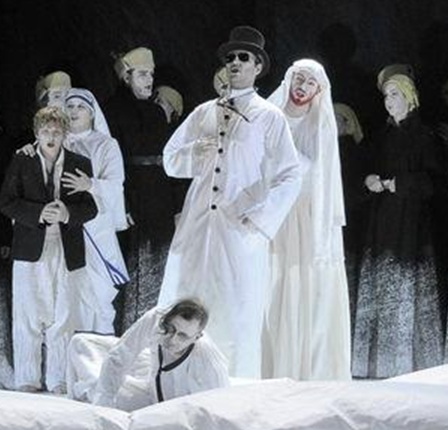
I n the last stage of his life Gogol is increasingly consumed by a religious mania. He considers his past work a sin and burns the second part of his major novel, ‘Dead Souls’. In the end he refuses to eat. In his final hours he is visited by the fantastic figures from his own works – and they show themselves to be more reasonable than he is himself at this point. Gogol has utterly broken with his previous life and renounces it; now it is avenging itself. … This opera is not so much a biography as a poetic and satirical study of one of the greatest Russian writers, whose emotional life is as mysterious and fascinating as his idiosyncratic works... Lera Auerbach … has found her own voice, and it is full of stylistic freedom and dramatic power.”T he person must, according to the DSM-IV, have at least two out of five symptoms:
— Theater an der Wien opera, program notes, 2011.
- (i) delusions, (ii) hallucinations, (iii) disorganised speech, (iv) grossly disorganized or catatonic behavior, or (v) functional incapacities or negative symptoms (such as alogia, avolition, etc)—for a substantial percentage of a one month period;
- Plus, continuous signs of disturbance must continue for at least six months;
- Plus, substantial social or occupational dysfunction must be evident;
- Required exclusion criteria include substance abuse, mood disorder, and pervasive developmental disorder.
I f you are expecting in Lera Auerbach’s new opera a Gogolesque, cynical account of human nature, or about the ruling class (‘We are the 99%!’), or a scatology as absurdist art, you will not find it here.
N or will you learn famous Gogol’s concept of the untranslatable Russian word пошлость (‘poshlost’). [Vladimir Nabokov explained this as “posh-lust”, “not only the obviously trashy but mainly the falsely important, the falsely beautiful, the falsely clever, the falsely attractive” (Nabokov 1944, p. 70)—the falsely transcendent.] Пошлость reduces reality to a sort of cavalier mediocrity and unrepentant vulgarity—a moral and spiritual condition from which humankind cannot escape—compulsive smutiness, radical pointlessness, compulsive garish carnival, absurd superfluousness.
N o, in this fantastical new opera we get nonstop existential angst and horror—superbly manifested in Auerbach’s score and libretto, and in an exceptionally fine production by Theater an der Wien (who commissioned the work), with performances by ORF Radiosymphonieorchester, Arnold Schoenberg Chor, Grazer Kapellknaben, and Mozartknabenchor Wien… a convincing reenactment, showing the suffering Gogol, receiving no effective medical help for his end-of-life psychiatric condition.
I t is as though Gogol’s invention, пошлость, ironically haunted him during his final days. Which amounts to a lesson to us all, to be careful about what we dream, what we think, what we dwell upon. As our minds begin to fail late in life, those one-time droll ideas of ours—every hubristic preoccupation; every cynical mental posture we ever indulged—every one of them could become real in our waning days—and we may be powerless to make them stop from bothering us. Bad karma or poetic justice, hunting you down in your own lifetime! Ein Alptraum jagt den nächsten!B efore writing a note of ‘Gogol,’ composer Lera Auerbach immersed herself in the writer’s complete works and over twenty books written about him. It would take similar efforts to begin to understand this opera: taking us inside the fevered mind of its title character, ‘Gogol’ is less a biographical narrative set to music than a phantasmagorical, psychological investigation. Given a virtuosic staging by director Christine Mielitz, it is also an overwhelming theatrical experience.” — Zwölftöner (Werner Kmetitsch), 17-NOV-2011.A uerbach regularly collaborates with soloists and ensembles including Hilary Hahn, Vadim Gluzman, Leonidas Kavakos, Julian Rachlin, Philippe Quint, Gautier Capuçon, Alisa Weilerstein, David Finckel, Kim Kashkashian, Tokyo String Quartet, Borromeo Quartet, Artemis String Quartet, Vanbrugh String Quartet, Kremerata Baltica, Camerata Pacifica, and the Chamber Music Society of Lincoln Center. Auerbach was born in the city of Chelyabinsk, adjacent to Siberia. After writing her first opera when she was 12, she moved to the U.S. in 1991 where she studied piano and composition at Juilliard. Her piano studies took her to the Hochschule für Musik und Theater in Hannover. She was awarded the Hindemith Prize by the Schleswig-Holstein Musik Festival in Germany, Deutschlandfunk’s Förderpreis, selected as a Paul and Daisy Soros Fellow, and in 2007 she was selected as a member of the Young Global Leaders forum by the World Economic Forum in Davos, Switzerland.

- Lera Auerbach website
- Theater an der Wien ‘Gogol’ production
- 'Gogol' at ORF.at [good pix here]
- Nikolai Gogol (1809-1852) page at Wikipedia
- Aleccia J. Before Code Blue: Who’s minding the patient? Little-known ‘failure to rescue’ is most common hospital safety mistake. MSNBC, 08-APR-2008.
- Allen E. A Fallen Idol Is Still a God: Lermontov and the Quandaries of Cultural Transition. Stanford Univ, 2006.
- Arkhangel'skii G. The medical environment of N. V. Gogol. Klin Med (Mosk). 1985;63:138-41.
- Bennett M. Reassessing the Theatre of the Absurd. Palgrave-Macmillan, 2011.
- Fanger D. The Creation of Nikolai Gogol. Belknap, 1979
- Friedlander M, et al. Delirium in palliative care. Oncology. 2004;18:1541-50.
- Fusso S, Meyer P, eds. Essays on Gogol: Logos and the Russian Word. Northwestern Univ, 1994.
- Geppert C, et al. To treat or not to treat: Psychosis, palliative care, and ethics at the end-of-life. Psychosomatics. 2011;52:178-84.
- Kmetitsch W. Review. Von heute auf morgen, 18-NOV-2011 [good pix here]
- LeFevre P, et al. Screening for psychiatric illness in the palliative care in-patient setting. Palliat Med. 1999;13:399-407.
- Milne L, ed. Reflective Laughter: Aspects of Humour in Russian Culture. Anthem, 2004.
- Nabokov V. Nikolai Gogol. New Directions, 1944.
- Orwin D. Consequences of Consciousness: Turgenev, Dostoevsky, and Tolstoy. Stanford Univ, 2007.
- Rasmussen K, Richardson J. Electroconvulsive therapy in palliative care. Am J Hosp Palliat Care. 2011;28:375-7.
- Witztum E, et al. Creativity and insanity: The enigmatic medical biography of Nikolai Gogol. J Med Biogr 2000;8:110-6
G ogol’s ‘grotesque’ is a—] means of estranging—a comic hyperbole that unmasks the banality and inhumanity of ambient reality.” — Susanne Fusso, p. 69.
No comments:
Post a Comment